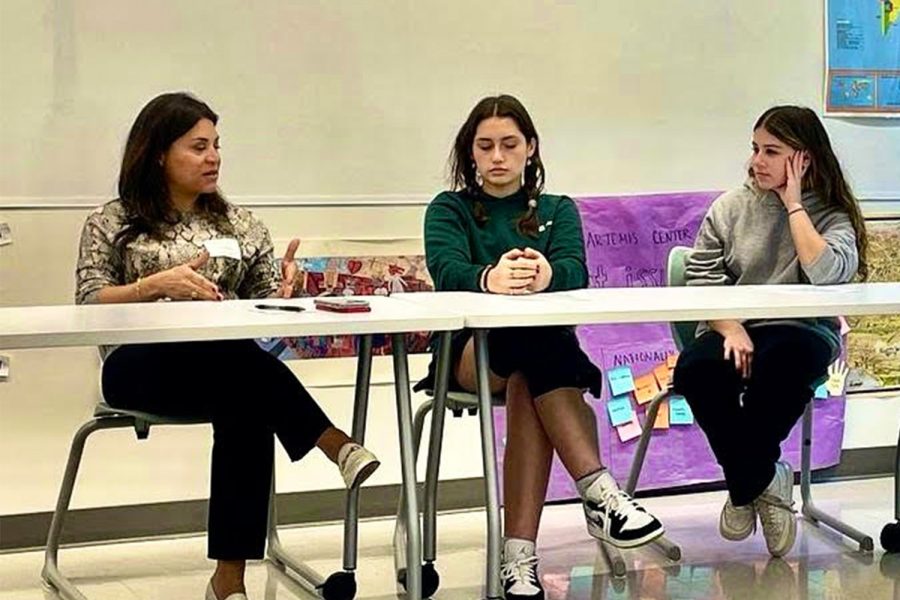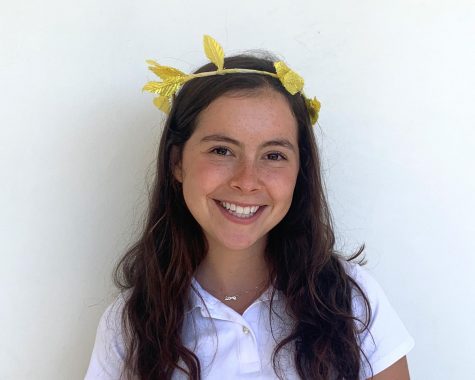Refugees and activism: united nations member Shirin Pakfar presents to students
Photo credit: Sophia Landers
Chief of Section, Private Partnerships and Philanthropy for the United Nations High Commissioner for Refugees Shirin Pakfar answers panel questions posed by Olivia Miro (’24). The conversation took place during lunch, Jan. 5., in history teacher Beth Gold’s classroom.
January 22, 2023
Chief of Section, Private Partnerships and Philanthropy for the United Nations High Commissioner for Refugees Shirin Pakfar spoke to students Thursday, Jan. 5, during lunch. The discussion took place in history teachers Margaret Shirk and Beth Gold’s classroom. All students and faculty were welcome to hear Pakfar discuss her experience working in Afghanistan 18 years ago and what a typical day in the life of a United Nations member looks like.
Senior Noor Afshar wrote a feature about Pakfar last year because of how interested and inspired she was by Pakfar’s work and journey to the United Nations. Afshar said that Middle Eastern students, like herself, felt seen and supported that a speaker was discussing topics that are extremely prevalent in Iran and Afghanistan, which are often overlooked by the media and local government officials.
“I love being able to share such a tenacious female change-maker and, specifically, one that is so skilled in international civil servants and international civil work with my community,” Afshar said. “She offers such a unique perspective that I had never heard before. It is so important to listen to her experiences and knowledge and apply her advice to my community.”
After speaking to Archer students last fall, Gold and the Artemis Center for Social Good and Public Service, were eager to bring Pakfar back because of the positive feedback she received from Archer students.
“As a young girl who’s also an Iranian refugee, I believe that her story was so impactful for me and so fulfilling to my dreams because I was able to see someone not only of my own gender, but my own race and culture and ethnicity,” Afshar said.
The Artemis Center organizes speakers throughout the year in hopes of promoting activism among the student body and educating the community about current events. Past speakers have discussed current events from ecocide to women’s rights, and Artemis Center board member Sophie Altemus (‘23) said that Pakfar’s experience offered an entirely new perspective that students have not been exposed to. Altemus said she was looking forward to asking Pakfar about current events unfolding in Middle Eastern countries such as the women’s revolution in Iran and Afghanistan’s refugee crisis.
“There was such huge enthusiasm and response to her presentation last year,” Altemus said. “We thought it was extremely necessary — especially with what is happening in the world right now — to bring her back and highlight such current events.”
During her presentation, Pakfar discussed what her typical day looks like as a member of the UN, what she has done to help Afghan refugees and what students can do to help those in desperate nations.
“I know she’s recently done some work with Afghan refugees, and I hope that she discusses her experiences in refugee resettlement,” Gold said before the event. “Especially since what’s going on in Iran is so timely and important and on the radar of a lot of Archer students, I think that she’s going to have more to say about Afghan refugees, which is the topic that I don’t think is getting enough attention.”
In response to Pakfar’s conversation, the Artemis Center will be holding a booth at First Fridays, where students can write postcards to legislators and members of the UN encouraging government officials to help the refugee crisis. They will also be organizing a drive for refugee organizations in the greater Los Angeles area so students can donate clothes, hygiene items and more.
“I hope that a lot of people use this speaker as an opportunity to come and educate themselves on topics they might not be familiar with,” Afshar said. “I really hope that the girls realize that when you’re in a high pressure work environment, you can still balance your life and empower others.”









